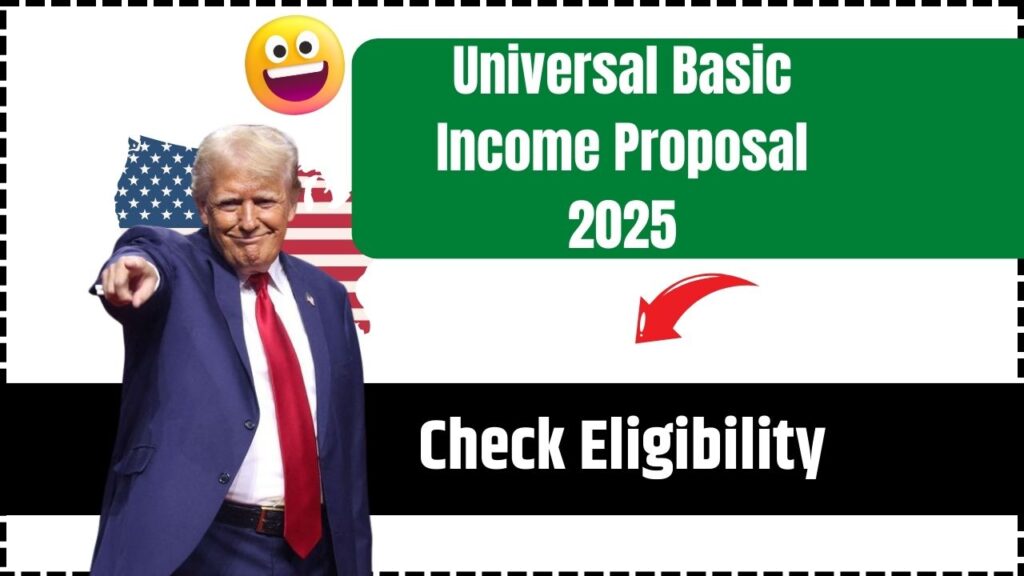
Universal Basic Income Proposal 2025: The idea of Universal Basic Income (UBI) has long been debated in economic and political circles. But in 2025, it’s no longer just theory—it’s becoming an active conversation at the national level in the United States. With economic uncertainty, inflation concerns, and rising automation, the UBI Proposal 2025 is gaining serious traction as a potential long-term solution to financial insecurity. This article will walk you through the current state of UBI in the U.S., explain who qualifies, how it would be funded, and what it could mean for the average American.
Universal Basic Income Proposal 2025
The Universal Basic Income Proposal 2025 is a bold step toward reimagining economic stability in the United States. While not yet federal law, the movement is gaining momentum due to successful pilot programs and growing public support. With thoughtful implementation, smart funding, and continued evaluation, UBI could provide millions of Americans with a foundation for a better life—financially, emotionally, and professionally. Stay informed by checking official resources and keeping an eye on congressional developments.
| Aspect | Details |
|---|---|
| Monthly Payment | $1,000 per eligible adult |
| Eligibility | U.S. citizens/legal residents aged 18+ with income below a certain level |
| Funding | Wealth tax, corporate tax, carbon tax |
| Rollout Timeline | Under Congressional review, potential launch by late 2025 |
| Pilot Results | Stockton, CA and Compton, CA pilots show increased job security, health |
| Program Duration (Pilot) | 12–24 months in most trial programs |
| Learn More | Congress.gov Official Bill |
What Is Universal Basic Income (UBI)?
Universal Basic Income is a policy in which the government gives all citizens a fixed amount of money regularly—usually monthly—regardless of their job status or income. The goal is to ensure a basic standard of living for everyone.
UBI is not a new idea. Versions of it have been discussed since the 18th century and more recently tested in places like Finland, Canada, and several U.S. cities.
UBI aims to:
- Provide financial stability
- Reduce poverty
- Allow people to pursue education, caregiving, or entrepreneurial goals without risking destitution
- Help adapt to job loss caused by automation
Current Universal Basic Income Proposal 2025
As of 2025, there is no nationwide UBI program in the U.S., but several state and local pilot programs have been launched. These pilots are shaping the national conversation.
Notable UBI Pilot Programs
- Stockton, California (SEED): 125 residents received $500/month for 24 months. Recipients saw improved job stability and mental health.
- Compton Pledge: Targeted low-income families and provided monthly payments. Many used the funds for rent, food, and education.
- Cook County, Illinois (Promise Program): 3,250 families received $500/month for two years. Participants reported less financial stress and more career opportunities.
These local experiments are informing how a national rollout might work.
Who Is Eligible for UBI Under the 2025 Proposal?
The 2025 proposal is aimed at creating broad but targeted support. While still under review, the proposed eligibility criteria are:
- Citizenship: Must be a U.S. citizen or legal permanent resident
- Age: 18 years or older
- Income Level: Some versions of the bill include income thresholds (e.g., under $75,000/year)
- Tax Filing: Must have filed taxes in the previous year
If the program is approved, eligibility could expand or change.
How Much Will You Get, and How Will It Be Funded?
Monthly Payment
- $1,000 per month for eligible adults
- Funds are unrestricted—you can use them however you choose
Funding Sources
UBI would be funded through a combination of:
- Wealth taxes on ultra-high-net-worth individuals
- Corporate taxes on large companies with billion-dollar profits
- Carbon taxes to support sustainability efforts while funding basic income
What Are the Benefits of UBI?
The pilot programs and global studies have shown several key benefits:
For Individuals:
- Reduced financial stress
- Improved health and mental well-being
- Greater job flexibility and retraining opportunities
- More time for caregiving or education
For Society:
- Increased consumer spending
- Lower poverty rates
- Simplified welfare programs
- Boost in local economies
These US States Are Set to Raise Wages Again—Find Out If You’ll Earn More
Entrepreneurs Rejoice: US Government Grants Now Available to Kickstart Your Business
US Unclaimed Unemployment Funds: Are You Missing Out on Thousands?
FAQs About Universal Basic Income Proposal 2025
Is UBI the same as welfare?
No. Welfare programs are conditional and often require work or income limits. UBI is unconditional and given to everyone who qualifies, regardless of employment.
Will UBI make people stop working?
Not likely. Studies from Stockton and Finland show that most recipients continued working and even found better jobs or pursued education with the stability UBI provides.
How will the government afford this?
Funding will come from a mix of tax reforms, closing tax loopholes, and environmental surcharges. The idea is to shift excess corporate and wealth profits into the public’s hands.
When will it start?
UBI is still being debated in Congress. If approved, the earliest rollout could be late 2025.
Can I apply now?
Currently, only local pilots are running.
Potential Challenges of UBI
While UBI is promising, it’s not without controversy:
- Cost Concerns: Critics worry about long-term affordability.
- Inflation: Some argue it may raise prices.
- Work Incentive Debates: There are questions about how UBI affects motivation and productivity.
However, evidence from pilots shows minimal negative impact and substantial positive outcomes.







